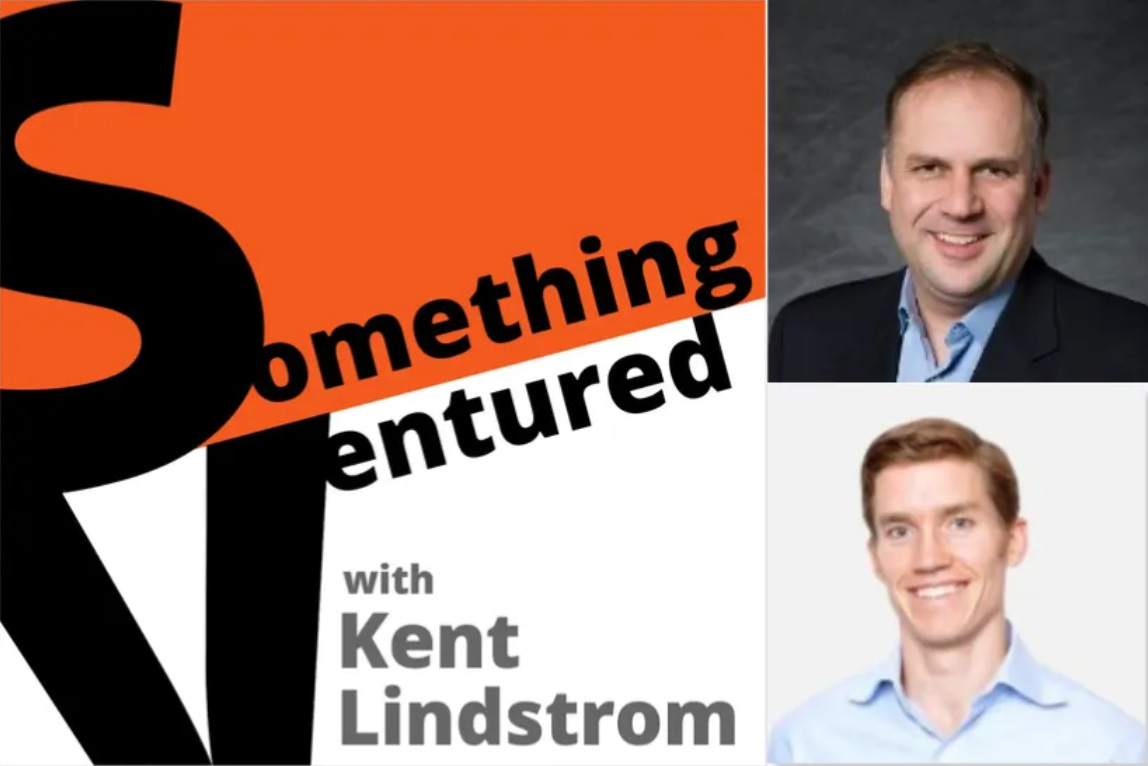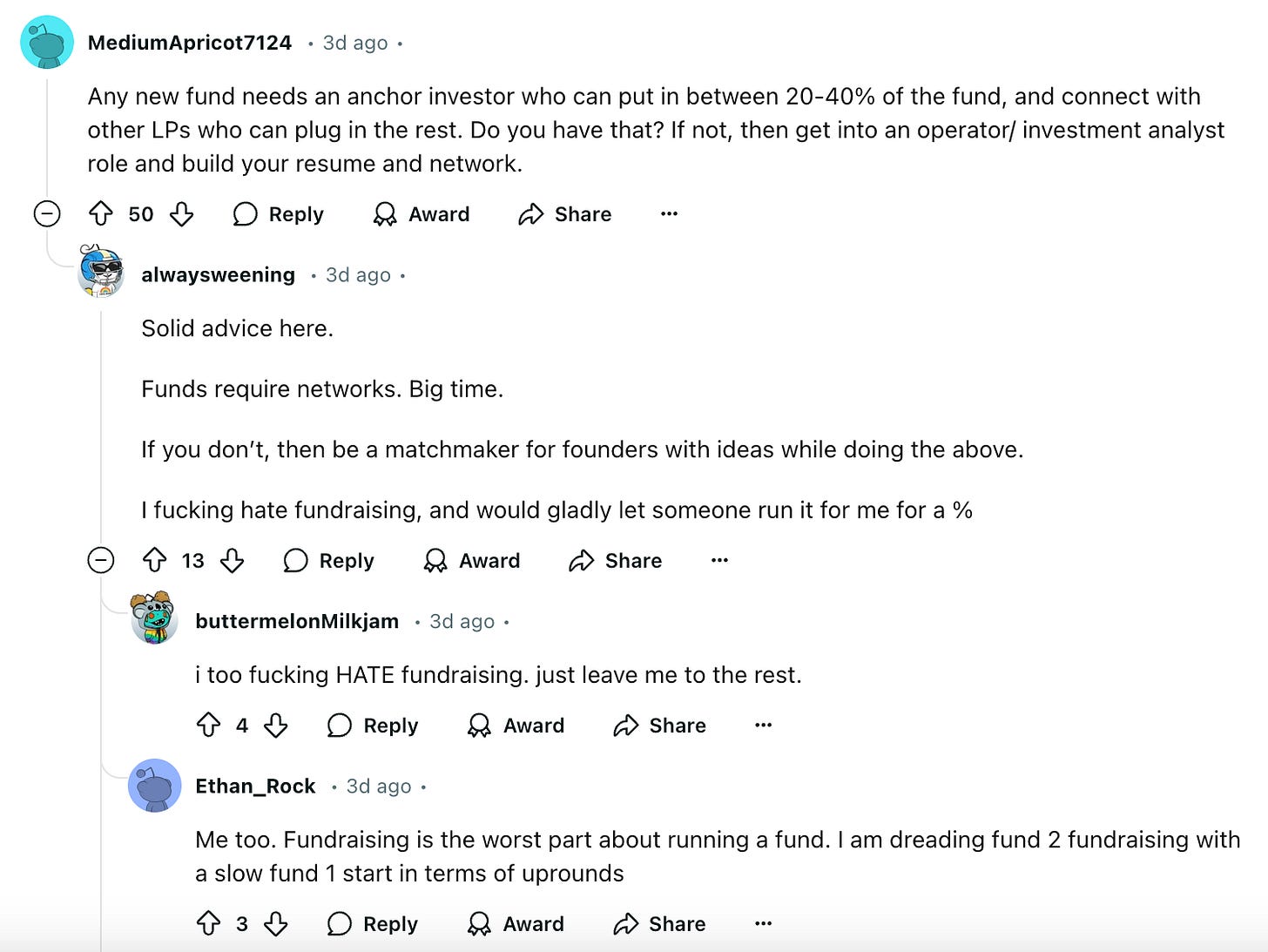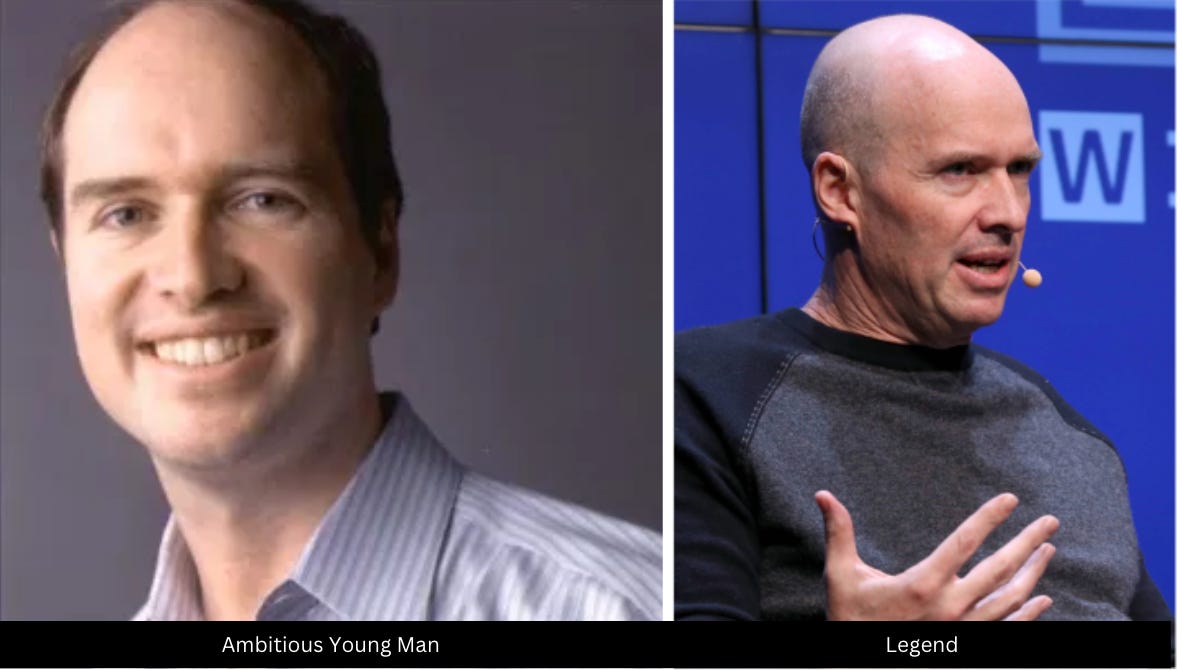Why Fundraising is the Most Crucial Skill for Aspiring VCs
To stay at the top of your game, lifelong learning through podcasts is essential. I'm lucky to have access to a fantastic range of high-quality podcasts. Recently, I've been enjoying *Something Ventured*, where Kent Lindstrom interviews Winter Mead—someone I know and respect.
They explored the often-overlooked challenges that emerging fund managers encounter, which can easily be overlooked by those new to the industry. Listening to conversations like these provides valuable insights into the complexities of raising a fund and the journey to success.
Having a fund means signing up for a sales role.
Lindstrom: "I have a friend who teaches at Stanford, and everyone wants to be a VC. I asked him what skillsets they think they'll use the most—analysis? Helping companies? He said, no, it's sales. It's 90% about convincing a company to take your money and persuading an LP to invest in you. It's essentially a sales job."
This supremely rings true in my experience. Every time I visit the venture capital subreddit, it feels like there's a new post complaining of aspiring fund managers bemoaning how much they hate fundraising—as if that’s a struggle unique to them.
Aside from masochists, most people don’t enjoy the relentless cycle of rejection. I’ve written about how even the most strategic fundraisers, who carefully target investors, often experience close rates of 10% or below after multiple meetings. It’s an incredibly time-consuming process, filled with repeated rejection.
With 61% of Americans owning stocks, many have some experience making investment decisions and may feel confident in their abilities, whether or not that confidence is justified. The WallStreetBets community, with its 17 million members, highlights the social and intellectual appeal of investing. Exploring the inner workings of fascinating companies led by visionary leaders is undeniably engaging. However, the true challenge is proving to others that you’re uniquely qualified to manage their investments more effectively than anyone else they’ve ever met.
Living in LA, I often meet people who came here from places like Iowa, where they were told not only that they’re funny, or even the funniest in their circle, but the funniest person anyone has ever met—out of thousands of conversations. That kind of standout reputation is exactly what fund managers need to convey to inspire confidence: the ability to differentiate themselves as uniquely talented in the most competitive field in finance.
Those who rush to hire a placement agent to offload the burden of fundraising are missing the mark. This approach can project an image of a VC who avoids relationship-building, shies away from confrontation, and lacks the foundational confidence to withstand scrutiny. Unless a fund is so extraordinary that it practically sells itself, GPs should focus on honing their ability to pitch effectively and endure the inevitable rejections. These experiences provide invaluable feedback, sharpening their strategy and evolving their skills into those of a truly exceptional fund manager.
Wanting to focus only on portfolio management is like dreaming of becoming a world-famous comedian but only wanting to write jokes. It doesn’t work that way. You have to put in the work—testing new material, facing rejection, enduring tough feedback, and constantly refining your skills. Becoming a great comedian means stepping onto the stage, feeling the audience’s reaction, and learning from each performance along the way.
Similarly, in investing, you could stick to portfolio management, but your ability to truly excel and maximize your earning potential will be limited. Without going through the grueling process of pitching, building relationships, and managing high-pressure situations, you might miss the nuances of what resonates in the market. Just like a comedian who only writes might not fully understand what lands with a live audience, an investor who avoids the full spectrum of the business risks missing out on critical growth experiences.
A clearer analogy would be aspiring fund managers expecting to be paid like NBA players for shooting three-pointers on an empty court. NBA athletes earn their pay under immense pressure, performing in front of millions of eyes. Similarly, when pitching to a high-profile, successful founder—someone who is not only brilliant and wealthy but also one of the most intimidating individuals you’ll ever encounter—you’ve entered the big leagues of finance. It’s a test of skill, resilience, and confidence under intense scrutiny.
You could have all the shooting skill in the world but crumble under the pressure of playing in a hostile arena against opponents whose livelihoods depend on shutting you down. There may be individuals out there who can sink 100 three-pointers in a row, outperforming even legends like Steph Curry or Larry Bird in a practice setting. However, without the ability to perform under the lights and in the face of intense competition, they’ll never see the same level of compensation or recognition.
In venture capital, the same principle applies. Someone might grow their personal portfolio from $10,000 to $150,000, proving their investment acumen on a small scale. But managing a $10 million portfolio under the relentless pressure of knowing your firm’s future depends on your decisions is an entirely different challenge. It’s not just about skill; it’s about thriving under the weight of responsibility and high stakes, where every decision could make or break your career.
Just as intellectual honesty is essential in investing, so too is self-awareness when starting your investment career. Knowing your strengths and areas of expertise is the foundation for building a solid track record. If your goal is to become a fiduciary of someone else’s capital, it’s crucial to begin by understanding your unique value proposition and how you can leverage it to deliver results.
Earning the responsibility of managing others’ capital requires more than just technical skills. You must inspire trust, instill confidence, and consistently exceed expectations. It’s not enough to promise exceptional performance; you must deliver on that promise and then some. This combination of integrity, relationship-building, and execution is what elevates an investor from competent to truly great.
One compelling example of a successful fund manager who faced significant fundraising challenges early on is Ben Horowitz, co-founder of Andreessen Horowitz. In the early stages of his career, Horowitz struggled with fundraising, facing rejection after rejection as he tried to pitch his vision for a new type of venture firm. He often recalls how hard it was to convince LPs to trust him and his team, given their lack of experience compared to established players in the industry. However, instead of giving up, Horowitz adapted his approach, refined his pitch, and focused on building strong relationships with potential investors.
Fundraising is not just about mastering financials and crafting the perfect pitch—it's an emotionally taxing journey that demands mental resilience. The process can be grueling, filled with rejection, criticism, and the constant pressure to prove one’s worth to potential investors.
For many aspiring fund managers, this emotional rollercoaster can take a significant toll, leading to moments of self-doubt and burnout. To overcome this, it’s crucial to cultivate a positive mindset and stay motivated in the face of setbacks. Embracing failure as part of the process, rather than an obstacle, can provide valuable learning experiences. It’s simply a numbers game.
Building a support network of mentors, peers, and fellow fund managers can offer encouragement and perspective, reminding you that persistence and emotional endurance are as vital as financial acumen. Taking care of your mental health—through practices like meditation, exercise, and celebrating small wins—can help maintain the stamina required to push through the toughest fundraising challenges and come out stronger on the other side.
Networking and relationship-building are key to long-term success in fundraising, extending far beyond just securing capital. The foundation of a successful fund lies in a strong, trusted network of investors, mentors, and advisors who can offer advice, opportunities, and introductions that may otherwise be difficult to access. These relationships provide a steady source of guidance and support throughout the entire journey, not just at the fundraising stage. It's important to understand that building these connections takes time, and the focus should be on creating genuine, lasting relationships that are mutually beneficial.
To effectively build this network, aspiring fund managers should actively participate in industry events, engage in online communities, and seek out mentorship opportunities. Approaching networking with a mindset of offering value and building trust is crucial—relationships built on reciprocity and authenticity tend to last longer and yield better results. Attending conferences, joining investor forums, and even volunteering for leadership roles within industry groups can help increase visibility and establish credibility. By taking these steps, fund managers can create a strong support ecosystem that not only aids in capital raising but also provides strategic advice and invaluable connections that will benefit their fund’s growth over time.
For new fund managers, understanding the foundational elements of structuring a fund is essential. Fund terms define the investment’s duration and objectives, setting the framework for what the fund aims to achieve. Management fees compensate the fund manager for their efforts, ensuring they are incentivized to manage the fund effectively. Carried interest, the share of profits allocated to the manager, serves as a key motivator to exceed expectations. However, it must be carefully structured to align the manager’s interests with those of the investors. The limited partnership (LP) agreement serves as the legal backbone of the relationship between the fund manager and investors, covering everything from profit distribution to governance structures. Grasping these elements is vital for raising capital and ensuring the fund operates smoothly and remains legally sound.
Mentorship is a critical component in the development of an aspiring fund manager, especially for those just beginning their careers. Learning from experienced professionals provides invaluable insights that can’t be gained through trial and error alone. While trial-and-error is often necessary for growth, it can be time-consuming and riddled with mistakes that could have been avoided with proper guidance. Mentors who have already navigated the complexities of fundraising, portfolio management, and deal structuring can offer invaluable advice and help emerging managers avoid common pitfalls.
Access to mentors also provides emotional support, which is equally important in the high-pressure world of fund management. These mentors can offer a steady hand, helping new managers navigate both the technical and emotional challenges of the industry. Their guidance can shorten the learning curve, helping new managers refine their strategies and focus on building long-term success. Having this support network not only improves decision-making but also instills confidence, allowing emerging managers to approach challenges with a clearer sense of direction.
Great fund managers understand that learning never stops, regardless of how successful they become. Seeking out mentorship, whether through formal programs or informal connections, is a proactive way to accelerate growth and deepen expertise. This ongoing relationship with experienced individuals can help emerging managers stay ahead of industry trends, adapt to new challenges, and develop the resilience needed to thrive in a competitive market. By actively pursuing feedback and guidance, new managers can foster continuous improvement, positioning themselves for long-term success and establishing a foundation of trust and respect in the investment community.
When approaching potential Limited Partners (LPs), it’s crucial to first do your homework—research their investment preferences, past portfolio, and risk tolerance to ensure you’re targeting the right investors. Ideally, begin with a warm introduction, if feasible, though it’s not essential. Then, customize your pitch to emphasize how your fund aligns with their interests. Why should they care and in what way are you thesis aligned with their investment history.
Structuring your pitch should focus on clarity and confidence: introduce your fund's mission, strategy, and track record (even if it’s early-stage), and emphasize your team’s unique strengths. Make sure to address potential concerns head-on, showing that you’ve thoroughly considered both the risks and rewards. In the first meeting, listen more than talk.
Dealing with rejection is an inevitable part of the process, but it’s important to view it as constructive rather than discouraging. When faced with a “no,” seek feedback to understand their reservations, whether it’s related to your fund’s strategy, management team, or market conditions. The goal is to find common ground where both you and the LP feel confident about the partnership. Providing concrete advice on handling these scenarios, such as how to frame a counteroffer or respond to tough questions, will make the article more practical and give aspiring fund managers the tools they need to navigate the fundraising process successfully.
Emotional intelligence plays a critical role in building lasting relationships within venture capital. Fund managers who excel at empathy, active listening, and communication foster trust and respect with investors, portfolio companies, and partners. By understanding the motivations and concerns of others, they can tailor their approach and create more meaningful connections.
In fundraising, being able to read the room and adapt the pitch based on cues from potential investors can make all the difference. A manager who listens attentively and responds thoughtfully will build rapport more effectively than one who simply pushes a script. These interpersonal skills are essential for gaining investors' confidence and creating a collaborative environment that supports long-term success.
In the competitive landscape of venture capital, differentiation is vital. Whether through a unique investment thesis, innovative relationship-building strategies, or a focus on emerging sectors, standing out in a crowded market can be the key to attracting both investors and opportunities. Successful fund managers know how to leverage their distinctive strengths and communicate a clear, compelling vision for their fund, ensuring they not only capture attention but also build long-term success.
As Winter Mead is well-known for saying, “know your superpower” and then double down on communicating that to close those who believe in you. Coupling this self-awareness with the effort of approaching the hundreds of potential investors needed to raise a fund positions you to land the most coveted job in finance. By embracing your unique strengths and persisting through the fundraising process, you’re more likely to build a solid network of supporters who believe in your vision and your ability to execute it.
Mr. Mowry is the Managing Partner of Palo Alto Partners. He serves as the CIO of a single family office, is an emerging manager, and helps other emerging managers through Coolwater, Kauffman, or in LA by targeting investors who are most aligned with their fund thesis.













